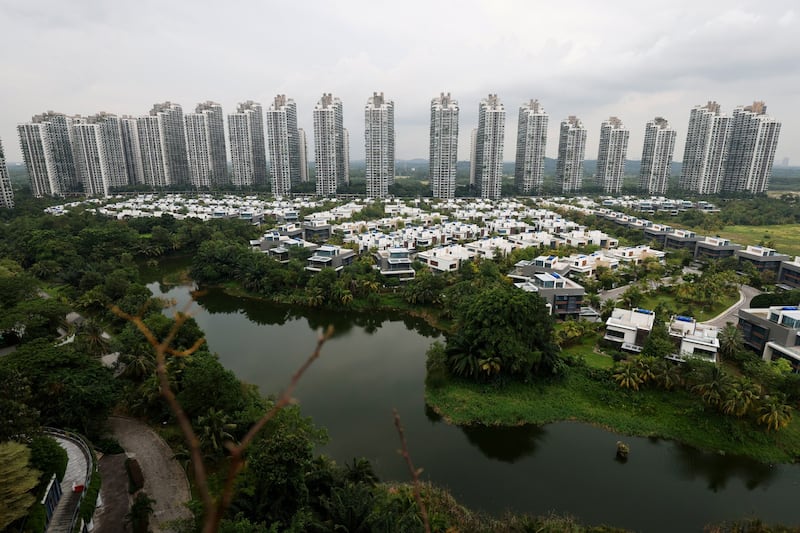Long considered safer than its embattled property-developer rivals, Chinese property developer Country Garden has revealed a record U.S.$6.7 billion loss for the first six months of this year.
The property company said it would raise U.S.$34 million by issuing 350 million shares at less than HK$1 (U.S.$0.13) on Wednesday to pay Hong Kong-based Kingboard Holdings Limited money it owes.
Country Garden’s total debt for the first six months of this year is U.S.$187 billion. It’s widely seen to be teetering on the brink of outright collapse.
The company said in a statement that it had not anticipated “the profundity and persistence of the market’s downtrend.”
In a filing on Wednesday, it warned it might not be able to meet its debt obligations, “which may result in default.”
"The avoidance of a default is dependent on additional financing support from regulators in coming weeks," Morgan Stanley analysts wrote in a note. "But we see a decreasing chance for this to happen."
According to Chinese business media outlet Caixin, Country Garden was seeking a Thursday meeting for bondholders to vote on its request for extra time to repay a U.S.$540.8 million onshore bond that is set to mature next week.
The distressed developer is hoping for a 40-day grace period for the bond as it attempts to secure creditor support for stretching out repayment by three years. The grace period is yet to be approved by onshore investors, it added.
Reuters separately reported that the vote was expected to be concluded by 10pm on Thursday.

Until recently, Country Garden was seen as a relatively calm port in the storm-tossed waters of China’s property sector, particularly in comparison to Evergrande, the world’s most heavily indebted property company.
Evergrande has liabilities of U.S.$328 billion and resumed trading on Monday in Hong Kong, where it has lost 99% of its share market value, after a 17-month suspension. Last year, its inability to deliver prepaid (off-plan) housing units to customers led to widespread social unrest.
Country Garden, with four times more property under development than Evergrande, seemed immune to the cascading defaults in the sector – until early this month, when it missed two interest payments to international bondholders.
Wednesday’s earnings were expected as something of a reckoning for the latest victim of a struggling real estate industry with insufficient funding and revenue streams to stay afloat.
According to reports, JPMorgan Chase & Co. analysts wrote in a note: "With or without an official default, Country Garden will no longer be able to grow, and we have doubt on its ability as a going concern."
Growth dilemma
In the absence of government stimulus, appetite for lending in the banking sector and customer demand, China’s housing market has been in steady decline – a trend that has accelerated this year.
Data from Kerui Real Estate Research, an R&D institution under E-House Enterprise Holdings Ltd. show the contract sales of China’s top 100 real estate developers in July decreased by 33% year-on-year.
The unfolding fates of Evergrande and Country Garden have further injected negative sentiment into the market.
Economists have called the current growth dilemma a deliberate result of policy decisions – specifically Politburo guidance in late 2016 that proposed “houses are for living in, not for speculation,” a signal that is reportedly close to President Xi Jinping’s heart.
Informed conjecture has it that Xi is determined to run the economy “cold” and shake out excess bad debt and render it lean again, based on the belief that the Chinese people have the grit, determination and appetite to “eat bitterness.”
Whether that is indeed the case or not, economists point out that even if consumer confidence starts to bounce back the property sector will inevitably go through a difficult phase and prices will continue to drop, exacerbating strapped cash flow in the industry.
Writing for RFA Mandarin, Yi Fuxian a demographer at the University of Wisconsin-Madison described the situation as a “real dilemma” with possible global ramifications.
“The real estate industry accounts for about a quarter of China’s economic activity and two-thirds of household wealth,” he said. “If the real estate ‘dam’ collapses, it will not only lead to an economic slowdown and a local government debt crisis but might also wash away China’s debt market and banking system, potentially triggering a global financial crisis.”
Reinforcing the “dam,” said Yi, would lead to young people being unable to afford housing and children, leading to “social sentiments of ‘this life isn’t worth living.’” He argued that amid such significant tension, it was likely that the landscape would tectonically snap in the direction of lower prices and a far less speculative property sector.
Edited by Mike Firn and Taejun Kang.
